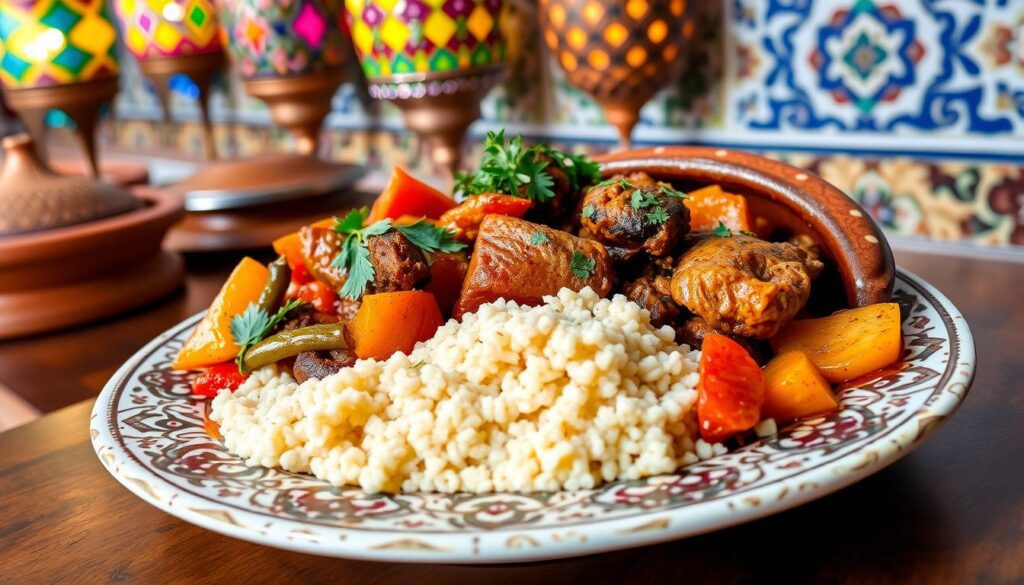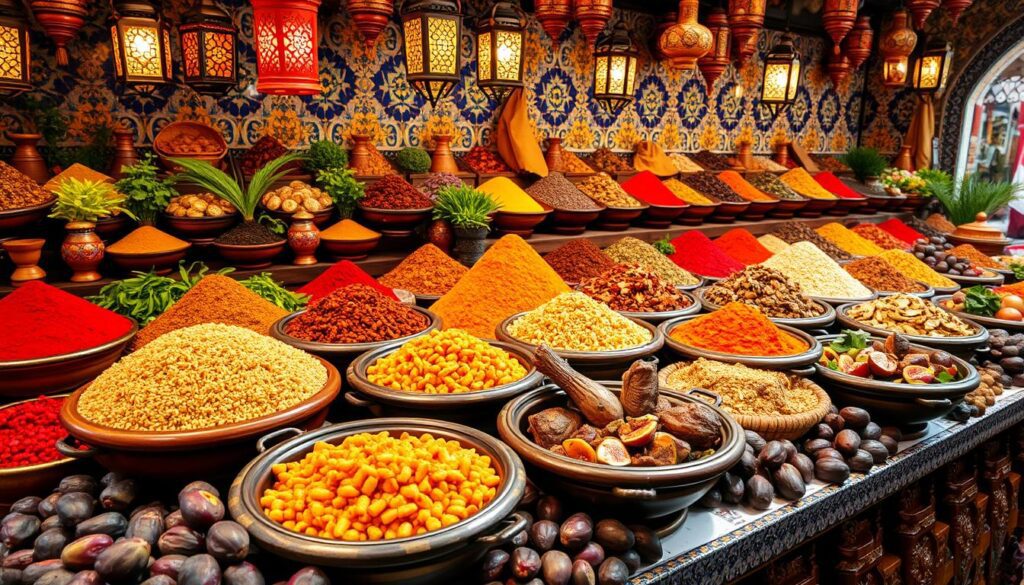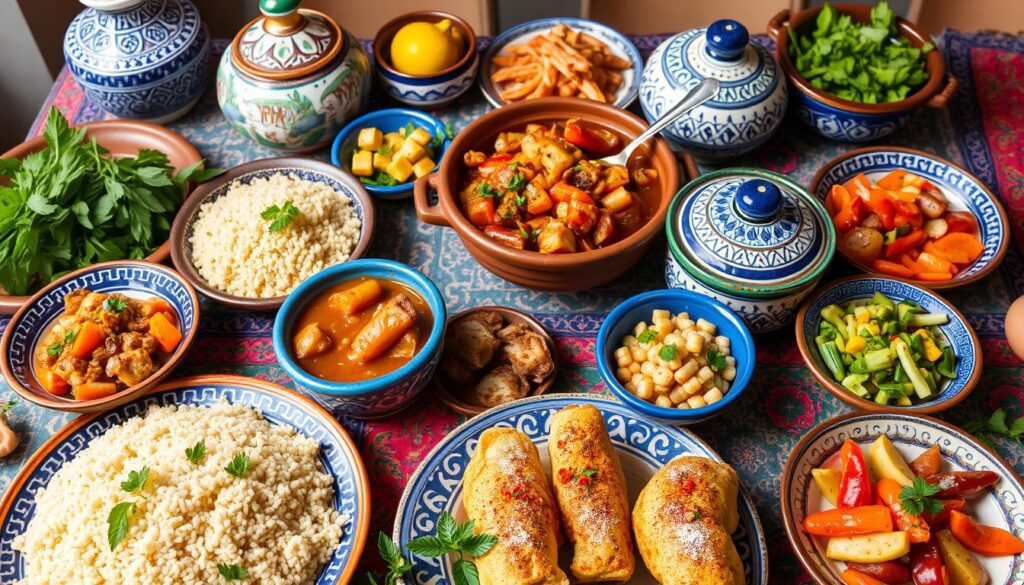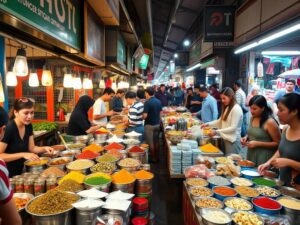Morocco Eating Guide: Unforgettable Dishes and Essential Dining Tips
Embarking on a culinary adventure in Morocco is like stepping into a vibrant tapestry of flavors, colors, and aromas that beckon every food lover. Imagine wandering through bustling markets, where the air is thick with the scent of cumin, saffron, and cinnamon, and your senses are invigorated by the vibrant sights of fresh fruits and spices. This unique experience is not just about tasting different dishes; it’s a journey into the heart of Moroccan culture and hospitality. As you explore, you’ll discover that Moroccan cuisine is a beautiful blend of influences from Europe, Africa, and the Middle East, creating a gastronomic experience that’s both rich and inviting. This Morocco eating guide will equip you with essential tips and highlight the best Moroccan dishes that you simply cannot miss, ensuring that your culinary adventure is nothing short of unforgettable.
Key Takeaways
- Moroccan cuisine is a rich blend of flavors influenced by Europe, Africa, and the Middle East.
- Explore local markets to experience aromatic spices and fresh ingredients firsthand.
- Must-try dishes include couscous, tagine, and harira.
- Morocco’s culinary traditions are steeped in hospitality and cultural significance.
- Embark on this culinary journey to fully experience the diversity of Moroccan flavors.
Introduction to Moroccan Cuisine
Moroccan cuisine introduction offers a vibrant experience that captures the essence of rich traditions. Traditional Moroccan food showcases a beautiful diversity shaped by unique culinary influences in Morocco’s landscape, including Amazigh, Andalusian, and Mediterranean traditions. This fusion of flavors brings forth a gastronomic journey that delights the senses.
Meals are often centered around hearty stews, intricate soups, and various meat dishes paired with fluffy couscous and fresh vegetables. Ingredients commonly found in these dishes are sourced locally, enhancing the overall flavor and authenticity of each meal. Slow cooking is a fundamental technique, allowing the rich flavors to develop and mingle over time.

Herbs and spices play a crucial role in Moroccan cooking, creating the complex flavor profiles that are signature to this cuisine. Commonly used spices include cumin, coriander, and saffron, each adding a distinctive touch. Moroccan cuisine is not only about the food itself but also reflects the country’s history, geography, and warm hospitality, inviting everyone to partake in its delightful and intimate culinary landscape.
Unique Flavor Combinations in Moroccan Dishes
The charm of Moroccan cuisine arises from its unique flavors of Moroccan cuisine, marked by an artful intertwining of sweet and savory. Traditional dishes often present unexpected flavor combinations in Moroccan food, creating a taste experience that is both delightful and memorable. For instance, chicken tagine skillfully marries tender chicken thighs with spices such as paprika, cumin, and cinnamon, harmonizing beautifully with the tartness of preserved lemons and the umami of olives.
Exploring various Moroccan dish profiles reveals how each meal reflects a rich cultural tapestry. Dishes are not only flavorful but also visually appealing, arranged in a way that invites the diner into a feast for the senses. The balance of hearty ingredients like garlic and onion with vibrant elements such as cilantro and honey creates a depth that is quintessentially Moroccan. This enchanting interplay of flavors draws you into the heart of Moroccan culinary traditions, making each dish a celebration of taste and culture.

Morocco Eating Guide:Must-Try Moroccan Dishes
Exploring Moroccan cuisine reveals an exhilarating array of flavors and preparation methods. Among the must-try Moroccan dishes, some stand out as symbols of the country’s rich culinary heritage. The dishes not only reflect Morocco’s history but also invite visitors to savor traditional Moroccan meals in an unforgettable dining experience.
Couscous: The National Dish of Morocco
Couscous holds the title of the national dish of Morocco and is a fundamental part of many meals. This tiny ball-shaped pasta, made from wheat, offers a delightful texture and absorbs nearby flavors beautifully. It often comes paired with a medley of vegetables and proteins, making it both versatile and satisfying. Spices elevate each serving, enhancing its naturally nutty flavor.
Tagine: North Africa’s Iconic Stew
No discussion of Moroccan food would be complete without mentioning tagine, a popular Moroccan stew. Named after the earthenware pot in which it is cooked, tagine typically features an assortment of meats, seasonal vegetables, and aromatic spices. Variations abound, with options ranging from tender chicken to succulent lamb, catering to a variety of taste preferences.
Other Popular Dishes: Harira and Bastilla
Harira is a classic traditional Moroccan meal, particularly revered during Ramadan. This hearty soup, rich in flavors and nutrients from lentils and tomatoes, offers a comforting experience. Another culinary gem is Bastilla, a savory pie that marries flaky pastry with pigeon or chicken, almonds, and a touch of sweetness. These dishes demonstrate the diversity of Moroccan cuisine, inviting everyone to explore beyond the meal’s staples.

The Role of Spices in Moroccan Cooking
Spices are a cornerstone of Moroccan cooking, contributing both flavor and aroma that define its vibrant dishes. These common Moroccan spices, such as cumin, cinnamon, and ginger, are integral to the unique culinary experience offered by this rich cuisine. The thoughtful combination of these spices enhances not just the taste but also embodies the deep cultural and historical significance of Moroccan gastronomy.
Common Spices Used in Moroccan Cuisine
In Moroccan cuisine, spices are much more than mere flavor enhancers; they are essential ingredients that shape the character of every dish. Staples like cinnamon and cumin add warmth and depth, while ginger provides a zesty kick. The careful selection of these spices highlights the culinary creativity present in Moroccan kitchens, ensuring that each meal is a delight for the senses.
Significance of Ras El Hanout
One of the most celebrated spice blends in Moroccan cuisine is Ras El Hanout. Known for its complexity, Ras El Hanout can contain up to 35 different spices, making it a versatile and essential component in many traditional dishes. The Ras El Hanout significance lies in its ability to bring together a symphony of flavors, showcasing the rich culinary heritage of Morocco. This blend not only influences the overall taste but also connects diners to the country’s deep-rooted spice traditions.





